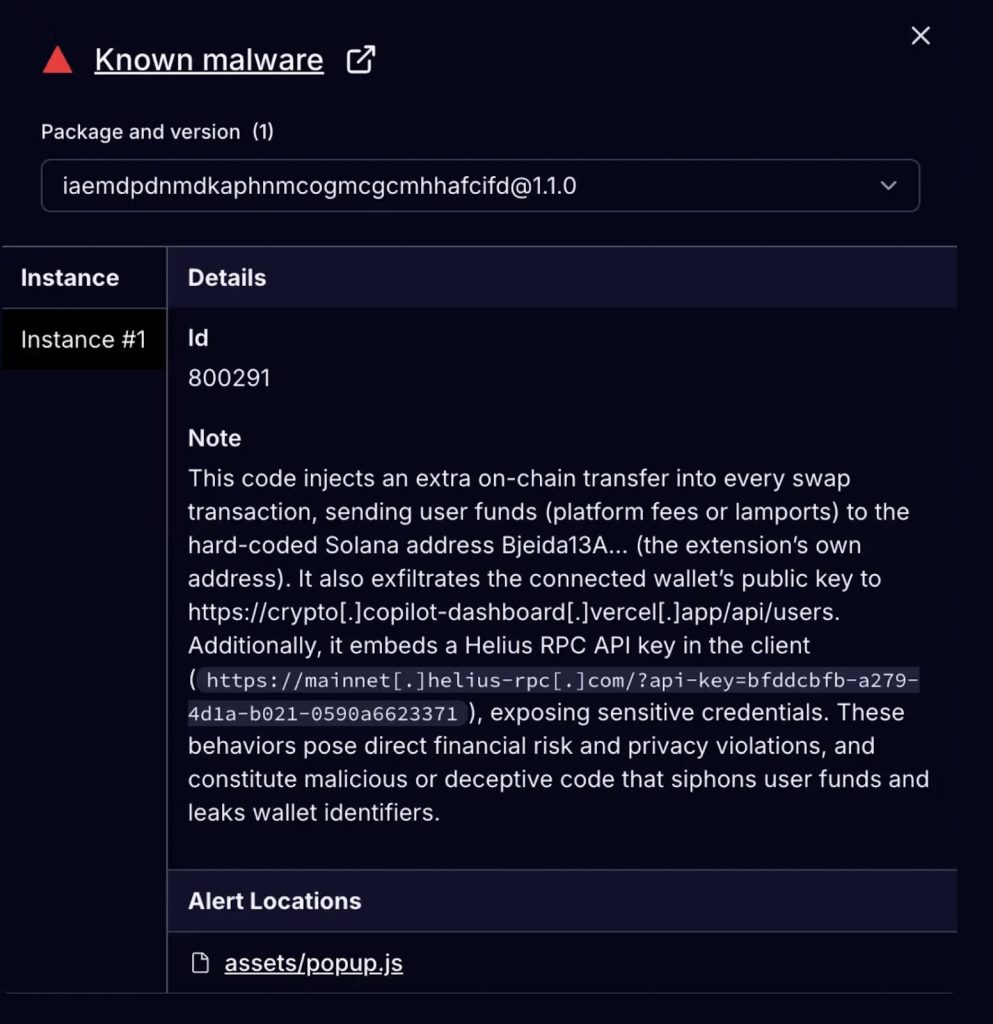A newly found malicious Chrome extension is stealing funds from Solana merchants by quietly siphoning a charge from each swap they execute, in accordance with new findings from Socket’s Risk Analysis Workforce.
The extension, known as Crypto Copilot, has been accessible on the Chrome Internet Retailer since June 2024 and markets itself as a shortcut for executing Solana trades immediately from customers’ X feeds.
Behind the interface, nonetheless, researchers discovered code designed to insert an extra switch into every Raydium swap, diverting not less than 0.0013 SOL, or 0.05% of every transaction, to an attacker-controlled pockets.

Crypto Copilot Sends Pockets Information to Suspicious Backend Whereas Draining Dealer Funds
Socket researchers say the extension constructs a traditional Raydium swap instruction however then appends a second instruction that transfers SOL to the pockets tackle Bjeida.
Customers solely see the respectable swap within the interface, and most pockets affirmation home windows show solely a high-level abstract of the transaction quite than the total listing of directions.
In consequence, merchants approve what seems to be an ordinary transaction, unaware of the hidden switch embedded inside it.
The charge logic is absolutely hardcoded contained in the extension and buried below layers of obfuscated JavaScript.
Socket notes that the extension applies whichever is larger between the minimal charge and the percentage-based charge, that means trades above 2.6 SOL incur the total 0.05% extraction.
Researchers discovered that the extension makes use of variable renaming and aggressive minification to hide the conduct, and the attacker’s pockets is labeled below an innocuous variable deep contained in the bundle.
The extension stays on-line on the time of reporting. Socket says it has submitted a takedown request to Google, however has not acquired affirmation that motion has been taken.
Past the charge theft, investigators additionally found that Crypto Copilot connects to a backend hosted on crypto-coplilot-dashboard.vercel.app, a misspelled area that reveals solely a clean placeholder web page.
Regardless of the empty web site, the extension often sends linked pockets identifiers and exercise information to this backend, together with utilizing a hardcoded Helius API key for transaction simulation and RPC calls.
A separate area tied to the device, cryptocopilot.app, is presently parked.
Researchers say the absence of documentation, a functioning dashboard, or any supporting infrastructure is inconsistent with a respectable buying and selling product and as a substitute displays frequent practices seen in malicious browser extensions.
Whereas on-chain exercise linked to the attacker’s pockets stays restricted, investigators consider the low transaction quantity possible displays the extension’s comparatively small distribution quite than an absence of threat.
They warn that the mechanism scales with buying and selling exercise, that means high-volume customers might lose bigger quantities over time with out noticing the incremental drain.
Crypto Losses Fall to 2025 Lows, however Browser Extension Assaults Proceed to Climb
The invention comes throughout a interval of heightened scrutiny round browser-based crypto threats. In July, greater than 40 malicious Firefox extensions have been discovered impersonating main pockets suppliers, together with MetaMask, Coinbase, Phantom, OKX, and Belief Pockets.
Koi Safety exposes 40+ malicious crypto pockets extensions in Firefox retailer focusing on seed phrases from @coinbase, @MetaMask, and @TrustWallet as crypto losses explode to $2.2B in 2025.#CryptoWallet #Hackhttps://t.co/0EcvDev8SY
— Cryptonews.com (@cryptonews) July 3, 2025
These extensions harvested pockets credentials immediately from customers’ browsers and transmitted them to attacker-controlled servers.
Exchanges resembling OKX publicly warned customers and filed complaints after discovering pretend plugins masquerading as official pockets instruments. Browser extensions have emerged as one of the persistent assault vectors in 2025, contributing to a rising share of crypto losses.
Pockets-related breaches accounted for $1.7 billion of the $2.2 billion stolen throughout the primary half of the 12 months, in accordance with CertiK. Phishing incidents added one other $410 million.
Regardless of the rise in extension-based threats, the broader crypto sector briefly skilled a decline in profitable hacks.
PeckShield recorded simply $18.18 million stolen throughout 15 incidents in October, the bottom month-to-month complete of the 12 months.
Crypto exploits plunged 22% in September, however losses nonetheless totaled $127M. The biggest assaults hit $UXLINK ($44M) and @swissborg ($41.5M), in accordance with information from @PeckShieldAlert. #crypto #DeFi #hackshttps://t.co/FsrFl0qJaw
— Cryptonews.com (@cryptonews) October 2, 2025
That determine had been far increased a month earlier when losses reached $127.06 million in September, pushed by almost 20 main exploits. However at the same time as total losses dipped, high-profile breaches continued.
The put up Warning: New Chrome Extension Drains Solana Merchants – 0.05% Stolen Per Swap appeared first on Cryptonews.
